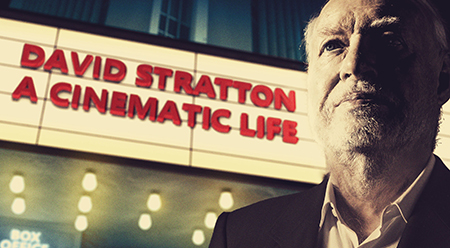 “I can’t imagine a life without film,” says Australia’s most revered critic, the English-born David Stratton. “I try to see a film every day. At least one.”
“I can’t imagine a life without film,” says Australia’s most revered critic, the English-born David Stratton. “I try to see a film every day. At least one.”
Film is David’s life. Filed in a ring binder labeled 1946 on a shelf in his office he can, without delay, extract a one-page “review” he wrote as a seven-year old after seeing the Australian film The Overlanders. At last count he’s seen 25,254 films and reviewed most of them. More than 1,000 were printed in the international film trade magazine Variety.
Australia gave David the opportunity to turn his passion for cinema into a profession when he was offered the job of Sydney Film Festival director. His brother Roger says their father was “beside himself with fury”. David was meant to return to England to run the family grocery business. He’d come to Australia in 1963 as a ‘Ten Pound Pom’, a scheme aimed at boosting migration, but had intended to stay only for the obligatory two years.
At that time the Australian film industry was practically non-existent but within a few years a growing band of courageous Australians was channelling their enthusiasm for storytelling into an extraordinary body of work. David helped champion them and their films, which he became more and more personally affected by.
“There was a time in the ’70s in the wake of Picnic at Hanging Rock and My Brilliant Career and others when Australian films were really embraced by Australians. People would look forward to the next one coming out and there was a real feeling of pride and affection for the mostly wonderful films made then,” says Stratton.
“There are more Australian films that are of high quality that didn’t find a large audience than disappointing films that did,” says David, who puts Breaker Morant, Gallipoli, Strictly Ballroom and Lantana among the Australian films that straddle popularity and excellence.
As David fell in love with Australian cinema, it helped him understand himself and his adopted country. The country eventually fell in love with him too as a result of his weekly appearances on television alongside Margaret Pomeranz.
Written and directed by Sally Aitken, this glorious, sometimes hilarious, sometimes serious, compelling story of Australian cinema. Told through David’s very particular gaze, he explores the films most important to him and Australia, and analyses their emotional punch.
Included are interviews with Australia’s biggest movie greats: the actors Nicole Kidman, Russell Crowe, Geoffrey Rush, Judy Davis, Hugo Weaving, Sam Neill, Rachel Griffiths, Eric Bana, Jacki Weaver; and the directors Gillian Armstrong, George Miller, Fred Schepisi, Bruce Beresford, David Michôd and Warwick Thornton… to name a few of the 52. They talk about their work, the films that have most affected them – and David.
David reveals why he identified with the boy in Careful He Might Hear You and expounds on his theory on the distinctiveness of Australian crime films. He highlights the importance of landscape and explains his about-turn on The Castle.
David also revisits the Romper Stomper controversy and describes how Head On gave him a window into a contemporary Australia he’d never seen before. He drills down into how mainstream Australia has come to understand the ongoing impact of colonization through films like Jedda and Samson & Delilah – and the injustice of the events surrounding the disappearance of Azaria Chamberlain.
Australian cinema has touched all Australians. David Stratton’s role as a conduit has changed him from an outsider looking into a national treasure recognised with an Order of Australia in 2015.
David Stratton: A Cinematic Life screens nationally from 9 March 2017. In the meantime, you can catch David in a number of special Q&A sessions in cinemas across the country. For more information, visit: www.transmissionfilms.com.au for details.
Image: David Stratton – photo by Mark Rogers
